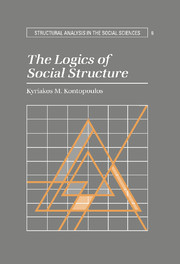Preface
Published online by Cambridge University Press: 24 October 2009
Summary
This book is the result of ten years of measured thinking, adventurous reading over a wide spectrum, and accelerated, almost compulsive writing as I neared the completion of my goal. With some trepidation, I present here some provisional notions, taking stock of my progress at this first stop in my ongoing program of research. Since my graduate days at Harvard I have been bothered by the failure of sociologists to address the fundamental question of upward structuration, an issue to which I developed a special sensitivity there in the course of frequent discussions with George C. Homans, Seymour M. Lipset, and Gino Ger-mani. I owe to the last, among many other things, the cultivation of a flexible, dynamic view of structural processes and collective agencies. At the time, although admiring it considerably in secret, I was an outsider to Harrison C. White's group, which was so successfully advancing network research. Having read Wittgenstein, Kuhn, and Lakatos, I was searching for a way to engage with the most fundamental issue of sociology in a postpositivist, nonfoundational manner. I have been working since then, in silence, exploring the borders of our discipline. I now feel that I have found an answer in what I would describe as the heterarchical conception of structuration. With this book, I stake a claim to new fields and conceptions and invite one and all to come and plow them together.
Given my rather heterodox trajectory, several influences on my thought were rather indirect and from a distance.
- Type
- Chapter
- Information
- The Logics of Social Structure , pp. ix - xPublisher: Cambridge University PressPrint publication year: 1993

